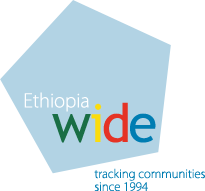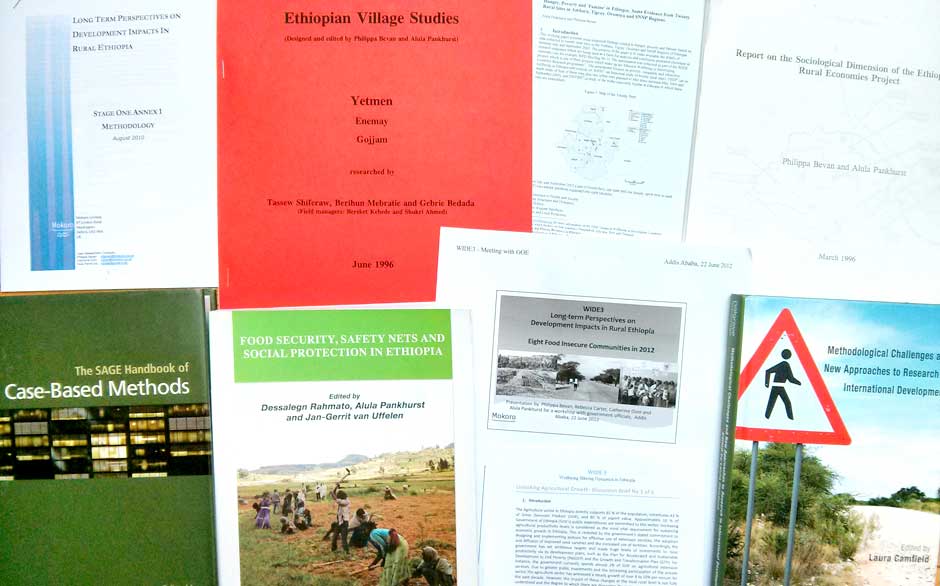Publications
WIDE book chapters on migration 2021
Three chapters of the book “Youth on the Move: Views from Below on Ethiopian International Migration”, edited by Asnake Kefale and Fana Gebresenbet and published by Hurst in the UK, are authored by Kiros Berhanu, Mulugeta Debalke and Catherne Dom, members of the WIDE team. The book is scheduled for publication in August 2021. The three chapters are based on the WIDE data on two communities, drawing mostly from the 2018 WIDE Bridge research although also on data from earlier rounds to map longer term trajectories of migration in these communities.
In her chapter Kiros Berhanu focuses on the multifaceted impacts of irregular migration to Saudi Arabia in Harresaw, a WIDE community in eastern Tigray where the large and increasingly female flow of migrants was influencing in complex ways the community’s life, well beyond the effects on migrants’ and their families’ economic opportunities or challenges. Kiros concludes in highlighting the importance of understanding these various impacts, for migration policymaking.
Mulugeta Debalke highlights the contrast between the perception of irregular migration in the public discourse in Ethiopia, and the views from the youth, their parents and even local officials in Aze Debo, a WIDE Kembata community where irregular migration to South Africa was increasingly prevalent over the past decade. In his conclusion Mulugeta argues that the nuances and complexities of ‘views from below’ can and should enrich the ‘top-down views’ that dominate migration policymaking in Ethiopia.
Catherine Dom compares how ‘ideas of the good life’ interacted and coevolved in partly mutually reinforcing ways with aspirations to and experiences and effects of migration abroad in Harresaw and Aze Debo. In her chapter she also shows how, far from the cliché of homogenization of local cultures under the assault of globalization, ‘ideas of the good life’ in both communities were evolving through processes of ‘glocalisation’ or fusion of the global and the local, in which migration was just one of many influencing factors.
WIDE Bridge 2018-19
A number of papers based on the WIDE Bridge data, presented at the 20th International Conference of Ethiopian Studies in Mekelle in October 2018 and discussing Globalisation and Rural Ethiopia, have been published as a Special Issue of the International Journal of Ethiopian Studies (Vol. XIII:1). This volume, which you can find here, contains the following essays:
Whither global rural Ethiopia? Alula Pankhurst and Catherine Dom
Youth and globalisation in four WIDE Ethiopia sites: Communication media and cultural practices. Alula Pankhurst
Diverse involvements in globally-linked modernisation processes: a comparison of four rural communities in Ethiopia. Philippa Bevan
The importance of rural connectedness: Contrasting livelihood changes in two rural communities of Ethiopia. Tefera Goshu
Is ICT in education, bridging or exacerbating the digital divide? Experiences of schools in two rural communities in Ethiopia. Agazi Tiumelissan
The impact of globalisation on agriculture in a coffee-producing rural community in Southern Ethiopia since 2011. Shiferaw Fujie, Philippa Bevan, and Agata Frankowska
Climate change and migration in rural eastern Tigray: Global and local factors and actors. Catherine Dom
Globalization, smallholder agriculture, and rural livelihoods: Opportunities, constraints and threats in a central Ethiopian community. Mulugeta Gashaw and Bayissa Abdissa.
The WIDE Bridge Policy Report March 2018, Methodology Paper August 2019, and the community reports for Aze Debo (Kembata), Ude/Sirba (East Shewa), Yetmen (East Gojjam) and Harresaw (East Tigray) can be downloaded here.
Notes from the concluding workshop on research outreach and methodology can be downloaded here.
Twelve papers on aspects of ‘Globalisation and Rural Ethiopia’ were presented at the International Conference of Ethiopian Studies in Mekelle October 1-5. Download the powerpoints here; and watch this space for information about journal publication.
The WIDE Bridge data were used to produce seven Series III Discussion Briefs; download an introduction, overview and the briefs here. These are available in English and Amharic books published in Ethiopia in March 2019. As with Series I and II briefs (see below) the topics were selected following consultations with government officials and development partners and the findings were discussed with government and development partners in November 2018 before final versions of the briefs were produced in December.
The radio and TV programmes produced with the Forum for Social Studies are now available on You Tube.
YouTube link WIDE radio programmes
Introduction to Ethiopia WIDE research
Inequalities and differentiation in rural Ethiopia
Education in rural Ethiopia: aspirations and uncertainty
Moving for work from rural communities
Women’s and girls’ economic participation in rural Ethiopia
Urbanisation, urban expansion, and thickening rural-urban links
Modernising smallholder farming and nonfarm enterprises
Diffusion of Knowledge, Learning and Technology Transfer
Insight on economic success in rural Ethiopia
Selected aspects of social protection
Young people’s economic experiences and transitions
YouTube WIDE TV programmes
Introduction to Ethiopia WIDE research
WIDE3-4 transition 2014-16
Reports
WIDE – Engaging with Policy since 2010
WIDE Methodology 2016 – which contains
- WIDE Foundations of Knowledge Framework
- The WIDE research methodology
- Website Methodology page
- Guide to using the WIDE data
- Guide to planning and implementing a similar study
- Analysis protocol for potential policy papers using WIDE data
- Ways of approaching a WIDE4 round of research
Discussion Briefs 2014 and 2016
The WIDE data were used to produce two sets of policy-related discussion briefs. They focus on topics selected following consultations with government officials and development partners, and were discussed with government in high-level forums held in 2014 (Series I) and 2016 (Series II).
Ethiopia WIDE Discussion Briefs Series I 2014. Find out more about these five discussion briefs and download them here.
Ethiopia WIDE Discussion Briefs Series II 2016. Find out more about these nine discussion briefs and download them here.
Download the Discussion Briefs in Amharic
WIDE Book 2017
Change and transformation in 20 rural communities in Ethiopia: Selected aspects and implications for policy was published in Addis Ababa in January 2017. The book was edited by Alula Pankhurst and the contributors were Philippa Bevan, Catherine Dom, Lilli Loveday, Alula Pankhurst, Tefera Goshu, and Sarah Vaughan. The chapters present the evidence and arguments used to write the Series II Discussion Briefs. The papers can be downloaded separately below.
CONTENTS
Preface Gebrehiwot Ageba
Twenty rural communities in Ethiopia and how they changed: Introducing the WIDE research and the selected policy-relevant topics, Alula Pankhurst, Catherine Dom and Philippa Bevan
Rurbanisation, urban expansion, and thickening rural-urban links (2010-13), Philippa Bevan
Differentiation, inequalities and social inclusion in rural communities, Alula Pankhurst
Youth transitions to adulthood and the role of interventions, Alula Pankhurst
Education in rural Ethiopia (2010-13): aspirations and uncertainties, Catherine Dom
Reproductive health and well-being: girls in transition to adulthood (2010-13), Philippa Bevan
Reproductive health and well-being: mothers and infants (2010-13), Philippa Bevan
Economic participation of women and girls in rural Ethiopia (2010-13), Lilli Loveday
Migrating for work from rural communities (2010-13), Catherine Dom
Insights on economic success in rural communities (2010-13), Tefera Goshu and Catherine Dom
Innovation, “technology transfer,” and positive social change: models and realities of transformation, Sarah Vaughan
Conclusions: Strengthening the effectiveness of development interventions in changing rural communities, Catherine Dom and Alula Pankhurst
Thanks to funding from DFID, Irish Aid and SIDA free copies of the book have been made available for Ethiopian researchers and practitioners. An international edition of the book has been published in the US by Tsehai Publishers and is available to purchase online. The title is Changing Rural Ethiopia: Community Transformations. Download the flyer summarising the book here.
Seminars
Three WIDE seminars were conducted in the UK in November 2016:
Tracking rural communities since 1994 – evidence from Ethiopia WIDE (Mokoro seminar, Oxford)
The changing faces of Ethiopia’s’rural’ communities: evidence from Ethiopia WIDE (Oxford University African Studies Centre Horn of Africa Seminar)
Tracking Ethiopian rural communities since 1994 – why it matters (ODI seminar, London)
WIDE3 2009-2013
Three stage final reports with Annexes
WIDE3 Stage 1 covered three drought-prone places and three with self-sufficient economies. The final report took forward theories and methods developed during WIDE1, and WIDE2 and DEEP but was also somewhat experimental. The report describes the methodology, the situations of the communities in 2010, modernisation processes since 1995 and the role of development interventions since 2003, impacts of recent interventions on the wellbeing of different kinds of household and people, and some experiences of government employees and volunteers.
Download the WIDE3 Stage 1 Final Report, five annexes, and a short Summary Report here.
WIDE3 Stage 2 covered eight drought-prone and food aid-dependent communities. There are four main sections in the Final Report covering the community situations in 2011, (dis)connects between government and communities related to the different interventions, some experiences of intervention implementation by different kinds of community member, and community trajectories into the future.
Download the WIDE3 Stage 2 Final Report, six annexes, and a short Summary Report here.
WIDE3 Stage 3 covered six communities with self-sufficient economies. The report describes the methodology, some headline findings from Stages 1 and 2, the histories of the communities, modernisation processes since 1991, the dramatic change in development interventions between 1995 and 2013, how the interventions were working in 2013, and ended with a section on learning from the past and looking to the future.
Download the WIDE3 Stage 3 Final Report, two annexes, and a short Summary Report here.
Three substantive reports from the Stage 1-2 transition project
Data from WIDE3 Stage 1 was used to produce three papers focusing in depth on emerging important policy issues: differentials between household and people; community-based government employees and volunteers – the go-betweens; and youth transitions to adulthood.
Download three long papers and three short summaries here.
Twenty community reports
One of the main outputs for each of the WIDE3 stages was a long description of each community organised on the basis of our complex system conceptual framework, some running to well over 100,000 words. While there were minor changes between the Stages, the structures of all the papers are the same allowing for easy cross-community comparisons. They all cover:
- The community place in its wider context
- Households
- Structures of inequality
- Livelihoods
- Human re/production
- Social re/production
- Community management
- Community ideas
Download the community reports here.
Three stage policy summaries
To assist in the design of the portfolio of research instruments at the beginning of each Stage a policy summary was prepared to establish a list of development interventions which we ought to find at work in the communities.
Macro Level Policies, Programmes and Models Entering Rural Communities: 2003-9
Macro Level Policies, Programmes and Models Entering Rural Communities: an update in 2011
Macro Level Policies, Programmes and Models Entering Rural Communities: an update in 2013
Rapid Briefing Notes
Work in progress.
Workshop presentations
Work in progress.
WIDE report methodology papers
Inception methodology papers
Stage 1 Inception Methodology Paper
Stage 2 Inception Methodology Paper
Stage 3 Inception Methodology Paper
Final report methodology annexes
Stage 1 Final Report Annex on Methodology
Stage 2 Final Report Annex on Methodology
Stage 3 Final Report Annex on Methodology
Academic publications
Book chapters and papers presented at conferences and seminars. Download here
WIDE2 & DEEP 2003-2006
WIDE1 1994-6
Village Studies (15)
These studies were constructed from (1) a background paper on aspects of the culture of the local area using secondary sources; (2) some protocol-guided rapid assessments conducted by fieldworkers administering the Ethiopian Rural Household Survey; and (3) a field visit by an anthropologist who took with him a draft village profile constructed from (1) and (2) for corrections and supplementation.
The research covered history, social composition, the seasonal calendar, farming, environment, non-farm activities, household management, children, health, consumption, households, marriage, divorce, inheritance, kinship, lineages and clans, life cycles, credit and social security, community decision-making, local organisations, religion, explanations of misfortune, community values, political attitudes, community organisation, social conflict, poverty and wealth, social mobility, status, social stratification, dissent, external relations, and government and NGO activities in the community.
Final Report for the UK Overseas Development Administration
In this section
WIDE Bridge 2018-19
WIDE3-4 Transition
WIDE3 2009-13
WIDE2 & DEEP 2003-6
WIDE1 1994-96

